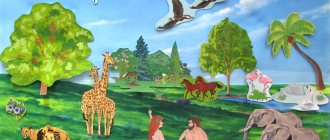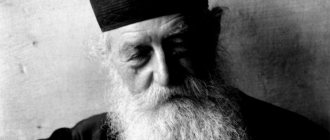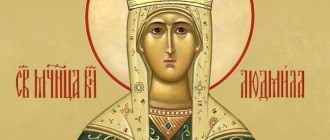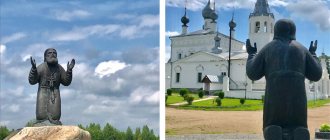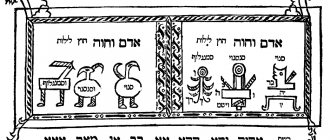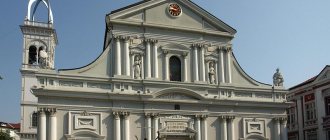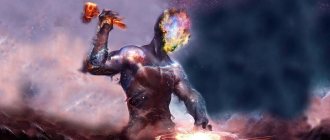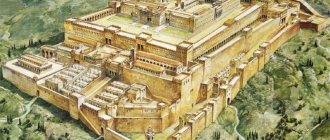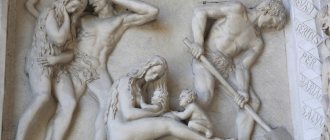world creation
In the beginning God created the heaven and the earth. The earth was formless and empty, and darkness was over the deep, and the Spirit of God hovered over the waters.
(Genesis 1, 1–2).
The biblical teaching about the creation of the world is briefly called the Six Days . Day means day. In 1823, Anglican priest George Stanley Faber (1773–1854) put forward the day-age theory. This opinion has absolutely no basis. In Hebrew, the word olam is used to express an indefinite period of time or era. The word yom in Hebrew always means day, day, but never a period of time. Rejecting a literal understanding of the day greatly distorts the biblical teaching about the creation of the world. If we take the day as an era, then how to determine evening and morning? How to apply the blessing of the seventh day and the rest in it to the era? After all, the Lord commanded rest on the seventh day of the week—the Sabbath—because He Himself rested: and God blessed the seventh day and sanctified it, for on it He rested from all His works (Gen. 2:3). The Lord created plants on the third day, and the sun, moon and other luminaries on the fourth. If we accept the idea of \u200b\u200bday - era, it turns out that plants grew without sunlight for an entire era.
The Holy Fathers understood the day of the first chapter of the book of Genesis literally. Saint Irenaeus of Lyons : “Restoring this day in Himself, the Lord came to suffer on the day before Saturday - that is, on the sixth day of creation, on which man was created, through His suffering giving him a new creation, that is, (liberation) from death.” Saint Ephraim the Syrian : “No one should think that the six-day creation is an allegory.” Saint Basil the Great : “And there was evening, and there was morning, one day... defines the measure of day and night and combines into one daily time, because twenty-four hours fill the continuation of one day, if by day we mean night.” Saint John of Damascus : “From the beginning of one day to the beginning of another day is one day, for the Scripture says: both there was evening and there was morning: one day.”
How then did the alternation of day and night occur before the creation of the luminaries, which appear on the fourth day? St. Basil the Great writes: “Then, not by the movement of the sun, but by the fact that this primeval light, in a measure determined by God, either spread out, then contracted again, day occurred and night followed” (Six Day Conversation 2).
The book of Genesis begins with a description of God's magnificent work of creating the world in six days. The Lord created the Universe with countless luminaries, the earth with its seas and mountains, man and the entire animal and plant world. The biblical revelation about the creation of the world rises above all existing cosmogonies of other religions, just as truth rises above any myth. Not a single religion, not a single philosophical doctrine could rise to the idea of creation out of nothing that surpasses reason: In the beginning God created the heavens and the earth.
God is self-sufficient and absolutely complete. For His existence, He does not require anything and does not need anything. The only reason for the creation of the world was the perfect Love of God. Saint John of Damascus writes: “The good and most good God was not content with contemplating Himself, but out of the abundance of His goodness He wanted something to happen that in the future would benefit from His benefits and be involved in His goodness.”[1]
The first to be created were disembodied spirits - Angels . Although the Holy Scriptures do not contain a narrative about the creation of the angelic world, there is no doubt that Angels by their nature belong to the created world. This view is based primarily on the clear biblical understanding of God as the omnipotent Creator who laid the foundation for all that exists. Everything has a beginning, only God is beginningless. Some holy fathers see an indication of the creation of the invisible world of angels in the words God created the heavens (Genesis 1:1). In support of this thought, Saint Philaret (Drozdov) notes that, according to the biblical narrative, the physical heaven was created on the second and fourth days.
The primeval land was unsettled and empty. Created from nothing, matter first appeared disordered and covered in darkness. Darkness was an inevitable consequence of the absence of light, which was not created as an independent element. Further, the writer of life Moses writes that the Spirit of God hovered over the waters (Genesis 1, 2). Here we see an indication of the creative and life-giving participation in creation of the third Person of the Holy Trinity - the Holy Spirit. An extremely short and precise definition - everything is from the Father through the Son in the Holy Spirit. Water mentioned in the above verse is the most important element without which life is impossible. In the Holy Gospel, water is a symbol of the life-giving and saving teachings of Jesus Christ. In the life of the Church, water has a special meaning, being the substance of the Sacrament of Baptism.
First day of creation
And God said: Let there be light. And there was light... And God separated the light from the darkness. And God called the light day and the darkness night. And there was evening and there was morning: one day (Gen. 1:3-5).
By Divine command, light . From further words: and God separated the light from the darkness, we see that the Lord did not destroy the darkness, but only established its periodic replacement with light to restore and preserve the strength of man and every creature. The Psalmist sings of this wisdom of God: You spread darkness and there is night: during it all the forest animals roam; lions roar for prey and ask God for food for themselves. The sun rises [and] they gather and lie down in their lairs; a man goes out to his work and to his work until evening. How numerous are Your works, O Lord! (Ps 103:20-24). The description of the creative deeds of each of the six days ends with a poetic expression. The word saints' day itself was taken literally.
World creation. Day 1,2,3. Nativity Cathedral in Mytishchi. Photo by O. Savichev
Light was created by the Divine word , possessing omnipotent creative power: for He spoke, and it was done; He commanded, and it appeared (Ps 33:9). The Holy Fathers see here a mysterious indication of the second Person of the Holy Trinity - the Son of God Jesus Christ, whom the Apostle calls the Word and at the same time says: All things came into being through Him, and without Him nothing began to be that was made (John 1:3).
When describing the first day, evening is put first, and then morning. For this reason, the Jews in biblical times began their day in the evening. This order was preserved in the worship of the New Testament Church.
Second day of creation
And God created the firmament... <...> and called... the firmament heaven (Genesis 1:7, and placed the sky between the water that was on the earth and the water above the earth.
and placed the sky between the water that was on the earth and the water above the earth.
On the second day, God created the physical heaven . The word firmament conveys the word of the Hebrew original, meaning spread out, for the ancient Jews metaphorically compared the firmament to a tent: you stretch out the heavens like a tent (Ps 103:2).
When describing the second day, we also talk about water, which is found not only on the earth, but also in the atmosphere.
Third day of creation
And God gathered the waters under the sky into one place and opened the dry land. And he called the dry land earth, and the collection of waters he called seas. And God commanded that the earth should grow greenery, grass and trees bearing fruit. And the earth was covered with vegetation. The Lord separated the water from the dry land (see: Gen. 1:9–13).
On the third day, oceans, seas, lakes and rivers , as well as continents and islands were created . Later, this caused delight in the Psalmist: He gathered up the waters of the sea like heaps, and placed the deep in storehouses. Let all the earth fear the Lord; let all who live in the universe tremble before Him, for He spoke, and it was done; He commanded, and it appeared (Ps 33:7-9).
On the same day, God created the entire plant world . This was fundamentally new: God laid the foundation for organic life on earth.
commanded the earth to produce flora . Saint Basil the Great says: “The then verb and this first command became, as it were, a natural law and remained in the earth for subsequent times, giving it the power to give birth and bear fruit” (St. Basil the Great. Six Days. Conversation 5).
The book of Genesis says that the earth brought forth grass, grass, and trees, yielding seed according to their kinds . The Holy Fathers attached fundamental importance to this, for it indicates the constancy of everything created by God: “What came out of the earth at the first creation is preserved to this day, through the preservation of the race by succession” (St. Basil the Great. Six Days. Conversation 5). As you can see, the third day was dedicated to the structure of our planet.
And God saw that it was good (Genesis 1:12). The writer of everyday life expresses in poetic language the idea that God creates wisely and perfectly.
Fourth day of creation
And God said that lights should appear in the firmament of heaven to sanctify the earth and to separate day from night. The calendar and time will now be counted based on the created luminaries. And the luminaries appeared: the sun, the moon and the stars (see: Gen. 1, 14–18).
In the description of the fourth day we see the creation of the luminaries, their purpose and their differences. From the text of the Bible we learn that light was created on the second day before the luminaries, so that, according to the explanation of St. Basil the Great, unbelievers would not consider the sun to be the only source of light. God alone is the Father of lights (see: James 1:17).
World creation. Day 4,5,6. Nativity Cathedral in Mytishchi. Photo by O. Savichev
The creation of luminaries had three purposes: first, to illuminate the earth and everything on it; a distinction is established between the luminaries of the day (the sun) and the luminaries of the night (the moon and stars). Secondly, separate day from night; distinguish between four seasons , organize time using a calendar and keep chronology. Thirdly, to serve for signs of the end times; this is spoken of in the New Testament: the sun will be darkened, and the moon will not give its light, and the stars will fall from the sky, and the powers of the heavens will be shaken; then the sign of the Son of Man will appear in heaven; and then all the tribes of the earth will mourn and see the Son of Man coming on the clouds of heaven with power and great glory (Matthew 24:29-30).
Fifth day of creation
On the fifth day, the Lord created the first living creatures living in water and flying in the air. And God said: Let the water bring forth living things; and let the birds fly over the earth. This is how the inhabitants of the waters appeared, aquatic animals, insects, reptiles and fish appeared, and birds flew through the air (see: Gen. 1, 20–21).
At the beginning of the fifth day, God turns His creative word to water (let water produce), while on the third day - to the earth. The word water is taken in this place in a broader sense, denoting not only ordinary water, but also the atmosphere, which the sacred writer also calls water.
On the fifth day, God creates a higher form of life than plants. By God's command, representatives of the water element appeared (fish, whales, reptiles, amphibians and other inhabitants of the waters), as well as birds, insects and everything living in the air.
The Creator creates the first beings of each kind (“according to kind”). He blesses them to be fruitful and multiply.
Sixth day of creation
On the sixth day of creation, God created animals living on earth and man in His image and likeness (see: Gen. 1, 24–31).
the description of the sixth creative day with the same words as the previous days (the third and fifth): let him produce... God commands the earth to create all the animals of the earth (a living soul according to its kind). God created everything in a certain sequence of increasing perfection .
And the Lord God created man from the dust of the ground, and breathed into his nostrils the breath of life , and man became a living soul (see: Gen. 1:26-28).
Man was created last, as the crown of creation . He was created in a special way. The Holy Fathers first of all note that his creation was preceded by the Divine Council between all the Persons of the Most Holy Trinity: Let us create man. Man is distinguished from the entire created world by the way the Lord creates him. Although his bodily composition was taken from the earth, the Lord does not command the earth to produce man (as was the case with other creatures), but He Himself creates him directly. The psalmist says, turning to the Creator: Thy hands have created me and formed me (Ps 119:73).
God said that it is not good for man to be alone.
And the Lord God caused the man to fall into a deep sleep; and when he fell asleep, he took one of his ribs and covered that place with flesh. And the Lord God created a wife from a rib taken from a man, and brought her to the man (Genesis 2:21-22).
The Lord, of course, could have created not only one married couple, but several and produced from them the entire human race, but He wanted all the people of the earth to be one in Adam. After all, even Eve was taken from her husband. The Apostle Paul says: From one blood He made the whole human race to dwell on all the face of the earth (Acts 17:26). And that's why we are all relatives.
At the dawn of human history, God established marriage as a permanent life union between a man and a woman. He blessed him and bound him with the closest bonds: they will become one flesh (Gen. 2:24).
Having created the human body, God breathed into his face the breath of life , and man became a living soul. The most important distinguishing feature of a person is that his soul is godlike . God said: Let us make man in our image [and] after our likeness (Genesis 1:26). about what the image of God is in man . When God created man, He brought all the animals and birds to him, and man gave them all names. The naming of names was a sign of man's dominance over all creation.
World creation. The creation of man. Church of the Nativity of the Virgin Mary in Kostino
With the creation of man, the six-day creation of the world ends. God created the world perfect . The hand of the Creator did not bring any evil into him. This doctrine of the original goodness of all creation is a sublime theological truth.
At the end of time will be restored. According to the testimony of the seer, the holy Apostle John the Theologian, there will be a new heaven and a new earth (see: Rev. 21:1).
Seventh day
And God finished His work that He had done on the seventh day, and He rested on the seventh day from all His work that He had done (Gen. 2:2).
Having completed the creation of the world, God rested from His works. The writer of everyday life uses a metaphor here, for God does not need rest. This indicates the secret of true peace that awaits people in eternal life. Before the arrival of this blessed time, already in earthly life we see a prototype of this state - the peace of the blessed seventh day, which in the Old Testament was Saturday , but for Christians is Sunday .
General Information about the Book of Genesis
The Book of Genesis (Bible) is the first book of the Old Testament and all Holy Scripture. It also opens the biblical section of the Pentateuch (in Judaism - the Torah). The author of Genesis, like the entire Pentateuch, is considered to be the prophet Moses. But it is important to remember that all books of the Bible are inspired by God. That is, they are the fruit of the joint creativity of the chosen righteous and the Holy Spirit.
The Book of Genesis has 50 chapters and more than one and a half thousand verses. They cover events from the creation of the world to the death of the Old Testament righteous man Joseph in Egypt. The narrative includes such well-known biblical stories as the fall of Adam and Eve, Cain's murder of Abel, the Flood, the Tower of Babel, the death of Sodom and Gomorrah, and the sacrifice of Isaac. Genesis also describes the history of the birth of the Jewish people.
Days of Creation (stained glass window of the Anglican Cathedral)
The Book of Genesis (Bible) - what other literature is there about the creation of the world
Every Orthodox Christian can independently delve into the study of the book of Genesis and, in particular, its first chapter. Many theological treatises of ancient and modern times are devoted to the theme of the six-day creation of the world. As examples of patristic interpretations, one can cite the works of Saints John Chrysostom (“On the Creation of the World”), Gregory of Nyssa (“On the Sixth Day”), and Basil the Great (“Conversations on the Sixth Day”). There are also works on this topic by the Hieromartyr Victorinus of Petavi (On the Creation of the World) and St. Ambrose of Milan (The Six Days).
Among the most famous modern works on the creation of the world is “The Orthodox Understanding of the Book of Genesis” by Hieromonk Seraphim (Rose). A religious-scientific view on this topic is presented in the works of Archpriests Konstantin Bufeev (“Orthodox Doctrine of Creation and the Theory of Evolution”) and Stefan Lyashevsky (“The Bible and the Science of Creation”). All these texts can be found on Orthodox Internet resources.
Read us conveniently on social networks:
Tags: Genesis chapter 1, Genesis Bible, in the beginning God created heaven and earth, and God created the earth, book of Genesis Bible
4th day
Next, the remaining celestial objects were created: the moon, planets and stars, including the Sun. This is how the world’s illumination, familiar to us, appeared, a source of natural, created energy and the ability to calculate time (measure days, months and years). The Book of Genesis (Bible) presents the cosmic bodies as nameless, indicating only that they are “great and small.” This method of mentioning celestial objects is intended to protect the human mind from their deification.
Each day in the text ends with the phrase “And God saw that it was good.” Thus, the Holy Scripture conveys to us the following idea: all of God’s creation is perfect and harmonious. As Saint Basil the Great wrote:
“Our God created nothing either in excess of what was needed, or insufficient in anything necessary.”
5th day
The next stage of creation is the creation of some species of the animal world: reptiles, fish and birds. God blessed them:
“Be fruitful and multiply, and fill the waters of the seas, and let birds multiply on the earth” (Gen. 1:22).
Thus a completely new, much more developed species of life arose, capable of feelings and movement. Genesis chapter 1 indicates that God created creatures “according to kind.” That is, with unique successive characteristics, which makes it impossible for one species to develop into a completely different one. Based precisely on the Old Testament term “genus,” the naturalist and scientist Carl Linnaeus three centuries ago developed a typology of living beings.
7th day
The Book of Genesis (Bible) reports that the six-day creation of the world was completed. The next day the Almighty “rested.” This expression should not be taken literally, because God does not get tired and does not need rest. This metaphor is a prototype of peace in the Kingdom of Heaven prepared for us. And a reminder that we should put aside our work on the holy last day of the week and dedicate it to God. For the ancient Jews it was Saturday, for Christians it was Sunday.
To dedicate a day to the Lord means to leave behind worldly worries and focus on what is useful and saving for our soul. You should at least attend the Sunday Liturgy. It is also advisable to take part in church Sacraments, devote time to good deeds, reading the Holy Scriptures or other spiritual literature. Archpriest Vitaly Drobotun notes:
“It is important to come to the temple of God, to pray, to be sanctified, to gain this strength in order to then withstand all the tests throughout the week. So that everything is fine at work and in the family, so that you have the strength to do good.”
The very name of the last day of the week reminds us why it is sacred. This is the solemn day of Christ's victory over death and the devil, the atonement of the sins of mankind, the renewal of our fallen nature. Let us quote the words of St. Gregory of Nyssa:
“The Lord, having become the ransom of our death, by His own Resurrection loosed the bonds of death and by His Resurrection paved the way [to Heaven] for all flesh.”
In Christian theology, there is the concept of “synergy” - the collaboration of the Lord and man in the matter of saving the latter. With His Resurrection, the Savior returned to people the opportunity to enter the Kingdom of Heaven. But He does not want to force us to do this - our personal will is also necessary to gain Eternal Life. We need to make an effort and follow the Savior, live like a Christian, and not betray Him with sins. Seeing a person’s zeal, the Lord joyfully follows him and helps him in salvation.
6th day
The penultimate ones in the sequence of Creation were created by the remaining land animals. They populated the entire planet, but it lacked a higher creation. Namely, a person capable of dominating nature and being in close connection with the Almighty.
The Creator created man from physical matter and infused life into him with His breath. Unlike previous living beings, man bears within himself the image and likeness of God Himself. That is, he has reason, freedom and an immortal soul. Thus, we belong to both the material and spiritual dimensions at the same time. Our calling is to be in perfect harmony with the Creator.
Man became the final chord in the Divine symphony of the creation of the Universe. He came to Earth only after its final arrangement and decoration. It was a gradual process in which nature, as if by steps, ascended from small to great. The complexity and beauty of the world are meant to remind us of the omnipotence and wisdom of God.
The forefather of people was called Adam (“taken from the earth”). He was placed by the Creator in a beautiful garden. Animals of all kinds came to Adam, and he gave them names. Thus the first man assumed dominion over nature.
One day, when Adam fell asleep, the Almighty took one of his ribs and created from it the female form of man - Eve. She became a faithful companion to Adam, as well as a mother for all humanity. The Creator commanded the first man and woman to be fruitful and populate the Earth.
Day 1: “In the beginning God created the heavens and the earth”
These are the words the Bible begins with. By heaven in this context, Christianity understands the spiritual world of angels. And God created the earth - physical matter. However, at first she was in darkness, there was nothing around her. Only “the Spirit of God hovered over the waters” (Gen. 1:2). By water we mean the primeval element, matter in its original form. Here the Holy Spirit appears as a separate person-Creator. Thus, already the first verses of Genesis refer us to the Most Holy Trinity.
St. Ephraim the Syrian suggests that at the very beginning of creation, the Holy Spirit made matter “generative,” that is, suitable for life. Also on this day, the Almighty created light and separated it from darkness (day and night). This was the aforementioned Divine light, which alternated the times of day before the creation of the heavenly bodies.
Genesis (Bible): Chapter 1
This text is the main source of Christian understanding of the origin of the Universe and people. It is thanks to the 1st chapter of Genesis that we know that space and time did not always exist, but were created by the One God. This is one of the main provisions of Orthodox doctrine. Saint Athanasius of Alexandria teaches:
“The universe did not come into existence by itself, because there is Providence about it, and it was not created from a ready-made substance, because God is not powerless, but out of nothing, a universe that did not exist before was brought into existence by God with the Word.”
That is why Orthodoxy rejects religious veneration of natural objects and phenomena, since it knows that they are not equal to their Creator. The universe arose not from His essence, but from nothing - by the will of a spaceless and timeless God. He is above His creation and is the First Cause of all things. In this regard, the Creator is also called the Almighty.
Chapter 1 of the Holy Scriptures also tells us what place man occupies in the universe. He became the main creation of God, the pinnacle and goal of His entire creative process. Man is created in the image and likeness of the Creator, called to Eternal Life in unity with Him. Archpriest Oleg Stenyaev instructs:
“You are created in the image and likeness of God. This whole huge world in which you live, created by the Lord in six days, was created for you. Creation cannot break away from its Creator and ignore His Laws.”
3rd day
Stage of the structure of planet Earth. By Divine will, the water receded in some places and dry land formed. Apparently, it was then that the continents and the hydrosphere took shape.
A variety of plants appeared, which God endowed with the ability to reproduce. Let us remember that the Sun did not exist at that time. The vegetation received energy from the Primordial Light. Saint Basil the Great sees a great spiritual meaning in this:
“The earth is decorated before the sun, so that those who go astray will stop worshiping the sun and recognizing that it gives the cause of life.”

